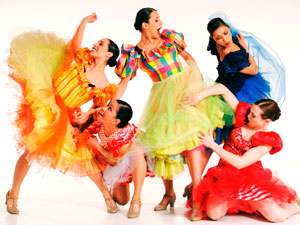Jose Limon was a pivotal figure in the evolution of modern dance, praised by the New York Times as “the greatest male dancer of his own or any other time.”
In November, Chicago’s acclaimed Luna Negra Dance Theater, dedicated to the work of Latino choreographers, will celebrate the 100th anniversary of Limon’s birth with a concert recreating his iconic “There is a Time.”

The performance, part of the Edison Theatre OVATIONS! Series, begins at 8 p.m. Nov. 7 and 8.
Founded in 1999 by the Cuban-born choreographer Eduardo Vilaro, Luna Negra Dance Theater blends ballet and modern dance with contemporary Latino and Afro-Caribbean forms. The company’s repertory includes original works by Vilaro as well as by acclaimed choreographers Ron DeJesus, Vicente Nebrada, Gustavo Ramirez Sansano, Pedro Ruiz and others. The company has performed at major festivals and toured throughout the United States, Panama and Mexico.
Limon was born in Mexico in 1908 but, as a boy, resettled in the United States after his family fled the Mexican Revolution. He briefly studied art at the University of California, Los Angeles, but, in 1928, moved to New York City and, after seeing his first dance program, began studying (and soon performing) with choreographers Doris Humphrey and Charles Weidman.
In 1938, Limon choreographed his first major work, “Danzas Mexicanas,” and, in 1946, after a stint in the U.S. Army, established the Limon Dance Company, which remains dedicated to his repertory. Limon died in 1972.
Frequently based on Mexican, literary and biblical themes, Limon’s choreography embraces natural movement patterns while also pairing seemingly opposed physical properties: rising and falling, lightness and weight, isolation and communion.
“There is a Time,” which debuted in 1956, was inspired by the Book of Ecclesiastes in the Bible, which famously reads, “To everything there is a season, and a time to every purpose under heaven … ”
Set to music by Norman Dello Joio, the piece opens with 12 dancers (symbolizing the book’s 12 chapters) gathered together in a loose circle. As the dance progresses, the circle is continually broken and reformed, the community maintained even as its members pass from birth through life and finally death.
Also on the program is “Batucada Fantastica” (1977), a rollicking homage to the Brazilian Carnival by the late Venezuelan choreographer Vicente Nebrada (1930-2002). Set to steel drums, whistles and other traditional Brazilian instruments, the piece consists of eight dramatic solos that culminate in a riotous ensemble.
The evening concludes with “Deshar Alhat (Leave Sunday)” (2008), a new work by Vilaro, which explores the mixture of Spanish, Moorish and Jewish influences that form Ladino (sometimes called “Judeo-Spanish”) culture.
Inspired by the lush music and rich history of Sephardic Jewish communities that settled in Latin America in the early 20th century, the piece creates a haunting tableau of loss and disappearance.
Tickets — $20 for students and children; $28 for faculty, staff and seniors; and $32 to the public — are available at the Edison Theatre Box Office and through all MetroTix outlets.
For more information, call 935-6543 or email edison@wustl.edu.